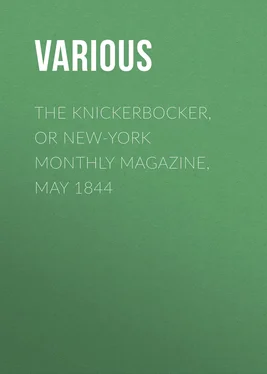Various - The Knickerbocker, or New-York Monthly Magazine, May 1844
Здесь есть возможность читать онлайн «Various - The Knickerbocker, or New-York Monthly Magazine, May 1844» — ознакомительный отрывок электронной книги совершенно бесплатно, а после прочтения отрывка купить полную версию. В некоторых случаях можно слушать аудио, скачать через торрент в формате fb2 и присутствует краткое содержание. Жанр: foreign_antique, periodic, foreign_edu, на английском языке. Описание произведения, (предисловие) а так же отзывы посетителей доступны на портале библиотеки ЛибКат.
- Название:The Knickerbocker, or New-York Monthly Magazine, May 1844
- Автор:
- Жанр:
- Год:неизвестен
- ISBN:нет данных
- Рейтинг книги:4 / 5. Голосов: 1
-
Избранное:Добавить в избранное
- Отзывы:
-
Ваша оценка:
- 80
- 1
- 2
- 3
- 4
- 5
The Knickerbocker, or New-York Monthly Magazine, May 1844: краткое содержание, описание и аннотация
Предлагаем к чтению аннотацию, описание, краткое содержание или предисловие (зависит от того, что написал сам автор книги «The Knickerbocker, or New-York Monthly Magazine, May 1844»). Если вы не нашли необходимую информацию о книге — напишите в комментариях, мы постараемся отыскать её.
The Knickerbocker, or New-York Monthly Magazine, May 1844 — читать онлайн ознакомительный отрывок
Ниже представлен текст книги, разбитый по страницам. Система сохранения места последней прочитанной страницы, позволяет с удобством читать онлайн бесплатно книгу «The Knickerbocker, or New-York Monthly Magazine, May 1844», без необходимости каждый раз заново искать на чём Вы остановились. Поставьте закладку, и сможете в любой момент перейти на страницу, на которой закончили чтение.
Интервал:
Закладка:
Upon hearing these words, Pelistes, who had stood in mournful silence, regarding the dead body of his son, burst forth with honest indignation. ‘By this good sword,’ said he, ‘the man who yields such dastard counsel deserves death from the hand of his countrymen rather than from the foe; and, were it not for the presence of the king, may I forfeit salvation if I would not strike him dead upon the spot.’
The bishop turned an eye of venom upon Pelistes. ‘My lord,’ said he, ‘I too, bear a weapon, and know how to wield it. Were the king not present you would not dare to menace, nor should you advance one step without my hastening to meet you.’
The king interposed between the jarring nobles, and rebuked the impetuosity of Pelistes, but at the same time rejected the counsel of the bishop. ‘The event of this conflict,’ said he, ‘is in the hand of God; but never shall my sword return to its scabbard while an infidel invader remains within the land.’
He then held a council with his captains, and it was determined to offer the enemy general battle on the following day. A herald was despatched defying Taric ben Zeyad to the contest, and the defiance was gladly accepted by the Moslem chieftain. Don Roderick then formed the plan of action, and assigned to each commander his several station, after which he dismissed his officers, and each one sought his tent, to prepare by diligence or repose for the next day’s eventful contest.
Taric ben Zeyad had been surprised by the valor of the Christian cavaliers in the recent battles, and at the number and apparent devotion of the troops which accompanied the king to the field. The confident defiance of Don Roderick increased his surprise. When the herald had retired, he turned an eye of suspicion on Count Julian. ‘Thou hast represented thy countrymen,’ said he, ‘as sunk in effeminacy and lost to all generous impulse: yet I find them fighting with the courage and the strength of lions. Thou hast represented thy king as detested by his subjects, and surrounded by secret treason, but I behold his tents whitening the hills and dales, while thousands are hourly flocking to his standard. Wo unto thee if thou hast dealt deceitfully with us, or betrayed us with guileful words.’
Don Julian retired to his tent in great trouble of mind, and fear came upon him that the Bishop Oppas might play him false; for it is the lot of traitors ever to distrust each other. He called to him the same page who had brought him the letter from Florinda, revealing the story of her dishonor.
‘Thou knowest, my trusty page,’ said he, ‘that I have reared thee in my household, and cherished thee above all thy companions. If thou hast loyalty and affection for thy lord, now is the time to serve him. Hie thee to the Christian camp, and find thy way to the tent of the Bishop Oppas. If any one ask thee who thou art, tell them thou art of the household of the bishop, and bearer of missives from Cordova. When thou art admitted to the presence of the bishop, show him this ring, and he will commune with thee in secret. Then tell him Count Julian greets him as a brother, and demands how the wrongs of his daughter Florinda are to be redressed. Mark well his reply, and bring it word for word. Have thy lips closed, but thine eyes and ears open; and observe every thing of note in the camp of the king. So speed thee on thy errand—away, away!’
The page hastened to saddle a Barbary steed, fleet as the wind, and of a jet black color, so as not to be easily discernible in the night. He girded on a sword and dagger, slung an Arab bow with a quiver of arrows at his side, and a buckler at his shoulder. Issuing out of the camp, he sought the banks of the Guadalete, and proceeded silently along its stream, which reflected the distant fires of the Christian camp. As he passed by the place which had been the scene of the recent conflict, he heard, from time to time, the groan of some expiring warrior who had crawled among the reeds on the margin of the river; and sometimes his steed stepped cautiously over the mangled bodies of the slain. The young page was unused to the sights of war, and his heart beat quick within him. He was hailed by the sentinels as he approached the Christian camp, and, on giving the reply taught him by Count Julian, was conducted to the tent of the Bishop Oppas.
The bishop had not yet retired to his couch. When he beheld the ring of Count Julian, and heard the words of his message, he saw that the page was one in whom he might confide. ‘Hasten back to thy lord,’ said he, ‘and tell him to have faith in me, and all shall go well. As yet I have kept my troops out of the combat. They are all fresh, well armed, and well appointed. The king has confided to myself, aided by the princes Evan and Siseburto, the command of a wing of the army. To-morrow, at the hour of noon, when both armies are in the heat of action, we will pass over with our forces to the Moslems. But I claim the compact made with Taric ben Zeyad, that my nephews be placed in dominion over Spain, and tributary only to the Caliph of Damascus.’ With this traitorous message the page departed. He led his black steed by the bridle to present less mark for observation, as he went stumbling along near the expiring fires of the camp. On passing the last outpost, when the guards were half slumbering on their arms, he was overheard and summoned, but leaped lightly into the saddle and put spurs to his steed. An arrow whistled by his ear and two more stuck in the target which he had thrown upon his back. The clatter of swift hoofs echoed behind him, but he had learnt of the Arabs to fight and fly. Plucking a shaft from his quiver, and turning and rising in the stirrups as his courser galloped at full speed, he drew the arrow to the head and launched it at his pursuer. The twang of the bow-string was followed by the crash of armour, and a deep groan, as the horseman tumbled to the earth. The page pursued his course with further molestation, and arrived at the Moslem camp before the break of day.
A light had burned throughout the night in the tent of the king, and anxious thoughts and dismal visions troubled his repose. If he fell into a slumber, he beheld in his dreams the shadowy phantoms of the necromantic tower, or the injured Florinda, pale and dishevelled, imprecating the vengeance of Heaven upon his head. In the mid-watches of the night, when all was silent except the footstep of the sentinel, pacing before his tent, the king rose from his couch, and walking forth looked thoughtfully upon the martial scene before him. The pale crescent of the moon hung over the Moorish camp, and dimly lighted up the windings of the Guadalete. The heart of the king was heavy and oppressed; but he felt only for himself, says Antonio Agapida, he thought nothing of the perils impending over the thousands of devoted subjects in the camp below him; sleeping, as it were, on the margin of their graves. The faint clatter of distant hoofs, as if in rapid flight, reached the monarch’s ear, but the horsemen were not to be descried. At that very hour, and along the shadowy banks of that river, here and there gleaming with the scanty moonlight, passed the fugitive messenger of Count Julian, with the plan of the next day’s treason.
The day had not yet dawned, when the sleepless and impatient monarch summoned his attendants and arrayed himself for the field. He then sent for the venerable Bishop Urbino, who had accompanied him to the camp, and, laying aside his regal crown, he knelt with head uncovered, and confessed his sins before the holy man. After this a solemn mass was performed in the royal tent, and the eucharist administered to the monarch. When these ceremonies were concluded, he besought the archbishop to depart forthwith for Cordova, there to await the issue of the battle, and to be ready to bring forward reinforcements and supplies. The archbishop saddled his mule and departed just as the faint blush of morning began to kindle in the east. Already the camp resounded with the thrilling call of the trumpet, the clank of armor, and the tramp and neigh of steeds. As the archbishop passed through the camp, he looked with a compassionate heart on this vast multitude, of whom so many were soon to perish. The warriors pressed to kiss his hand, and many a cavalier full of youth and fire received his benediction, who was to lie stiff and cold before the evening.
Читать дальшеИнтервал:
Закладка:
Похожие книги на «The Knickerbocker, or New-York Monthly Magazine, May 1844»
Представляем Вашему вниманию похожие книги на «The Knickerbocker, or New-York Monthly Magazine, May 1844» списком для выбора. Мы отобрали схожую по названию и смыслу литературу в надежде предоставить читателям больше вариантов отыскать новые, интересные, ещё непрочитанные произведения.
Обсуждение, отзывы о книге «The Knickerbocker, or New-York Monthly Magazine, May 1844» и просто собственные мнения читателей. Оставьте ваши комментарии, напишите, что Вы думаете о произведении, его смысле или главных героях. Укажите что конкретно понравилось, а что нет, и почему Вы так считаете.












